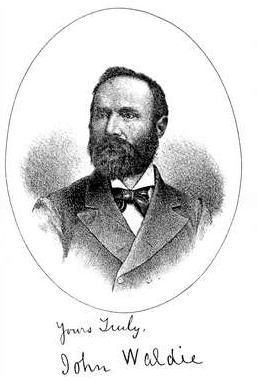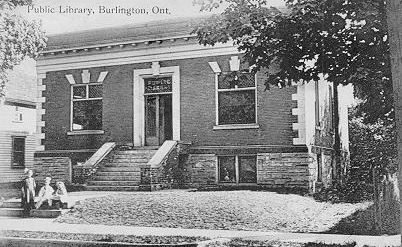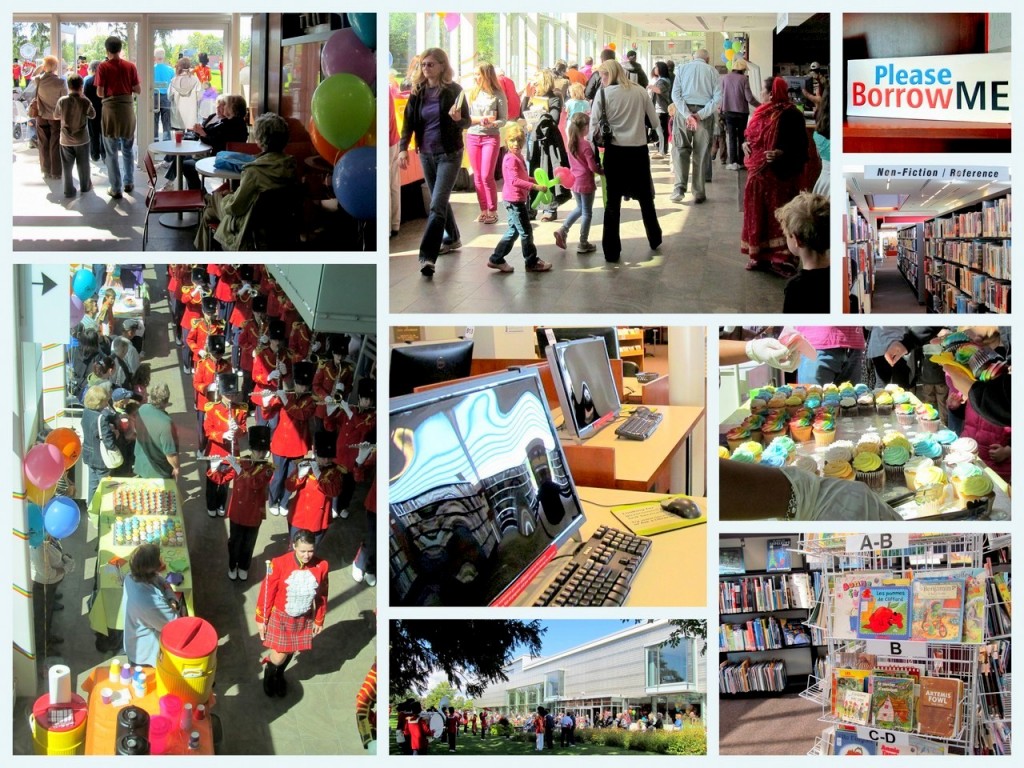BURLINGTON, ON September 28, 2012 You may recall the recent spat between the Mayor of Toronto’s brother, Doug Ford, and Margaret Atwood, famed Canadian literary icon. Aside from the eye-opening revelation that Mr. Ford had no idea who Ms. Atwood was, he and his brother, Mayor Rob Ford, on elected promises of tax cutting, were about to eliminate several community libraries. Quelle Horreur!!! The Twittersphere exploded. Facebook campaigns were hatched. Newspaper headlines joined the harangue. Canadian literati rose en masse and Ms. Atwood became their witty champion. A ‘Libraries-Are-Essential!’ REVOLT erupted.
And yet, really, have public libraries become a subsidized luxury that we, as a debt-ridden democracy, can no longer afford?
The naysayers say NO. They do believe public libraries are invaluable venues for all strata of society to not only access current information, but as research centres and repositories of our diverse social histories, local and global.

Maureen Barry, CEO of the Burlington Public Library and a consummate professional has overseen the move deeper into electronic media yet keeping real books on shelves.
As Maureen Barry, CEO of the Burlington Public Library writes, “For 140 years, generations of Burlington residents have helped shape who we are and what we do.” She goes on, “Our thriving library system is a testament to the many citizens who have supported their public library as patrons and volunteers.”
Consider this. Public libraries as an IDEA of ‘free and open access to the public’ only really caught on in Victorian England. Prior to that, public access to cherished sacred and secular written texts – and a better education – was pretty much non-existent. Illiterate serfs remained illiterate serfs. Public access, of sorts, initially began during the violent upheaval of the French Revolution (1789-1799) when cleric manuscript collections and rich nobles’ private libraries were confiscated and became ‘state property’. Over 300,000 items became a part of the newly conceived national library, the Bibliothèque Nationale in Paris. “Old ideas of monarchy, aristocracy and religious authority were abruptly overthrown by the Enlightenment principles of equality, citizenship and inalienable human rights.” These principles were a natural outcome of the invention of the printing press during the 15th century. “The affordability of the printed word boosted the democratization of knowledge.” (Wikipedia) And that democratization became the cornerstone of today’s democratically inspired public library service, a service available to the general public regardless of wealth or education.
The first known library in Canada was established at a Jesuit seminary in Quebec City in 1635. The public were not allowed access. The first public library in Lower Canada was founded in Montreal in 1796, a mere seven years after the French Assembly in Paris published the first ‘Declaration of the Rights of Man and the Citizen’. The first public library in Upper Canada opened in Niagara in 1800.
It took another 100 years to build a proper public library in Burlington. But that did not stop the IDEA of a public library service taking root in this growing lakeside community within the newly hatched Dominion of Canada. Library services in Burlington began in 1872 when local public school trustees voted to spend $56 to purchase a suitable supply of books from the Toronto Board of Education. These books were placed in the reception hallway at the schoolhouse located on the southeast corner of Brant and Caroline Streets. Members, paying fifty cents a year, were able to access the collection for one hour on Friday evenings.

John Waldie, early library patron, was the MPP oversaw the merger of Port Nelson and Wellington Square into the Village of Burlington.
It took the initiative and open-mindedness of a former local resident, of Scottish descent, to build the first ‘free’ public library. And he, John Waldie, did a lot more ‘community-building’ before he finally got around to doing that. During the course of a very successful career as a wheat trader in Burlington, then lumber merchant in Toronto, and as a re-elected MPP for Halton, Mr. Waldie was largely responsible for amalgamating the two lakeside communities of Port Nelson and Wellington Square into the Village of Burlington in 1873.
Several decades later, primarily through his broad-minded philanthropy, the first library in Burlington was built on Brant Street (on the site of the current City Hall.) It also shared the premises with the town offices and council chambers of the time.

First Burlington Public Library on Brant Street, 1913. Current home of City Hall. Photocredit: Burlington Public Library
Today, a 140 years later, with a somewhat staggering budget of $8.5 million (2011) allocated for staff, maintenance, IT acquisitions, and material book purchases and with a registered user base of less then half the population of Burlington, the public library could be seen as an expensive civic extravagance by the rest of the ‘unregistered’ city population. Begging the question again, are public libraries too expensive, especially in the age of the internet?
Let’s look at some other statistics provided by the library’s public relations department. In 2011, nearly 2 million items were borrowed from the library; nearly one million ‘unregistered’ patrons visited library branches; near 45,000 attended library specific programs; and over 100,000 information requests were fulfilled by library staff. All told, it would appear that this particular library, our library, for the monies allocated, is serving the regional populace very well.
There is no question though those libraries, like us, in this burgeoning internet era, have had to adapt. Today, Information Technology (IT) infrastructure at the library often consumes a greater proportion of the budget than the book acquisition fund. Within the BPL’s Strategic Plan (2012-2015) entitled: ‘The Next Chapter: Thinking Outside the Books’, the BPL intends to further improve functionality and accessibility “by upgrading the core computer system”. The new reality is that we are all increasingly ‘plugged in’. Like it or not.
In Alberta, city libraries charge patrons anywhere from $5 to $20 a year for library cards, but in Ontario, the Ontario Public Libraries Act forbids charging money for access to a library or for borrowing books. There are, thus, few other options for generating revenue aside from taxes. All the more reason for the BPL to provide exemplary ‘connected’ library services to the tax-paying ‘plugged in’ public.
Many would argue, (myself included), that libraries, regardless of spiraling IT and staff costs, continue to provide an irreplaceable democratic role within our young Canadian society. To close them in the name of the ‘global’ internet, would not only close access to those who cannot afford purchasing a private library or pay for monthly internet access, but closure would diminish the nurturing lifeblood of local vibrant communities. Communities coalesce within the ‘free and accessible’ democratic framework of library branches. Public libraries are fundamentally a democratic institution. And one sign of a diminishing democracy would be the closing of community libraries.
It is hard to imagine the lack of an element that we take so much for granted today: electricity. This means of illumination only became available to the general public at the beginning of the twentieth century, (about the same time that Waldie donated thousands of books to form the backbone of the Burlington Public Library.) Today, we plug in, bounce around on WIFI, and unthinkingly consume megawatts of purchased electrical power to illuminate our expensive laptops and computers. Primarily, we use this bought power to read items for work, school or pleasure: briefs, newspapers, text messages etc, and increasingly, e-books. But, worth asking, what happens if the power goes out, or, Harper forbid, the economy collapses? Communities, without the resources of their public libraries, would suffer profoundly.
Free e-books were first developed in 1971 by the late Michael S. Hart, founder of Gutenberg.org. More here:
The greater question remains, can we, as Canadians, AFFORD public libraries? The time and money we privately expend on consumer-electronic portals is far greater than any we physically devote to our library. Likewise, some would say that television, YouTube and the ubiquity of photo imagery – (‘A picture tells a thousands words’) – have usurped literacy altogether (a la Doug Ford).
And yet, on closer examination, it is clear that the fundamentals of literacy remain the same for all times and for all ages.
Creating strong narrative arcs to teach and to guide, and using potent language effectively to inform and advise, are the results of a solid education grounded in the basics of reading and writing. Learning how to think is built on the constructions of other’s better words. Their thought-filled written scripts funnel our curiosity and creativity so that we, in turn, develop new insights and pass on our know-how. In that regard, the story-telling cuneiform clay tablets of Sumer dating back to 2500 BC really are the antecedents of the trendy ‘tablets’ of today. The difference is that ‘being literate’ now involves additional skills beyond reading and writing: one must also become computer literate.
As much as the internet does increasingly pre-occupy our time, attention and money, a successful public library providing popular library services – as a kind of ‘out reach’ extension of a nurturing public school system – continues to constructively guide our ever-inquiring minds. As many also well know, a well-directed search or inquiry through the library is a welcome antidote to the growing anxiety iDisorder of ‘E-Information Overload’. The library has an information service many find useful: – Just Ask-a-Librarian: It is not surprising that the Burlington Public Library website was visited over 1.5 million times last year. That works out to over 4000 ‘hits’ per day. Yes, active minds seek answers.
Rather than redundant or too expensive, public libraries have become increasingly necessary filaments that maintain the democratic ideals espoused by our freedom-fighting democratic forefathers. Without them we would also become increasingly disenfranchised from the roots of our very real earth-bound communities. As vibrant hubs of community service, public libraries today provide much more than free access to current newspapers, periodicals, CDs, DVD’s and books. They also offer early reading programs, computer access and training, literacy tutoring for children and adults alike, and a safe haven for ‘intellectual freedom’. Altogether, they augment the basic tenets of our democracy.
The mission statement for the Burlington Public Library states, “Enriching Burlington by supporting 21st century literacies, lifelong learning, and community connections.” Yes. That is what they do. As Ms. Maureen Barry so aptly writes, “Our public library is truly a dynamic civic commons. “ Yes, that is what it is. All the more reason for us, within the larger community, to continue to support and promote it. Because, as much of the rest of the war-torn and weary world knows: if we don’t protect and use this hard-won democratic ‘freedom’, we just might lose it.
Fiscal prudence and long term accountability must, of course, be continuously evaluated and considered. Cutting back on some library services might be necessary in the days ahead, but never, ever, must we contemplate cutting out our public libraries completely.

And now, a bit of fun.
The Top 100 Books of All Time.
For those who prefer non-fiction: The Top 100 Non-Fiction Books of All Time –
Better yet, JOIN The Burlington Public Library.
It is FREE, still, for those who live, work or pay taxes within Burlington.
Also coming up at the Burlington Public Library on September 29th: The Human Library. Eleven men and women, of diverse backgrounds, some from oppressive totalitarian regimes, use the ancient arts of ‘story-telling’ and dialogue to break down barriers of prejudice that have shaped their lives. Their stories of disenfranchisement – and ultimate survival – continue to open our minds to the challenges of our ever-evolving humanity. Book your half hour with an engaging living person.
These stories remind us all of the on-going preciousness of an open-minded community-orientated democratic public library service in Burlington, and in Canada.
Margaret Lindsay Holton is both an environmentalist and a community activist. She is an artist of some renown and the designer of a typeface. She is also a photographer and the holder of opinions, which are her own, that she will share with you in an instant. She appears as an Our Burlington columnist every two weeks.





















“Margaret Atwood is only ONE articulate voice.
Libraries will only become an ‘essential public service’ if more than 50% of the voting populace demand it.”
It is true; WE MUST acknowledge the seeming WHIMSICAL RUNAWAY SPENDING by the federal government on “big-ticket” items.
In most cases, which are not open to public scrutiny, by virtue of the Harper government’s unwillingness to provide project costs to Parliament, Canadians are left to examine the entrails of the financial misadventures.
See also: The G-8, G-20 World Summit at a cost of $1.2 BILLION.
WE are QUITE CERTAIN, had the details of the proposed acquisition of the F-35A, fifth generation STEALTH Lightning II aircraft been made known to Canadians, more than 67% would have voted against the purchase.
Disclosure in that case has become an attempted post-mortem with a bevy of super ministers, bureaucrats and associates running for cover.
Runaway Fighter—(45.13) Broadcast Date: Friday, September 28, 2012
https://www.cbc.ca/fifth/2012-2013/2012/09/runaway-fighter.html
Who declined to be interviewed? —
https://www.cbc.ca/fifth/2012-2013/2012/09/interviews-refused.html
Agree.
We, as Canadians, have one big problem … As long as the elected Government of the day has CONTEMPT for its electorate, our options, as citizens, are very limited. I don’t think most Canadians are ‘pro’ an ‘elected dictatorship’. Methinks this may well be the subject of another column …
Thank you for your comments & links.
Fun clip from This Hour has 22 Minutes …
Margaret Atwood is only ONE articulate voice. Libraries will only become an ‘essential public service’ if more then 50% of the voting populace demand it.
With our national debt hitting $600 billion next March, (see: Canadian Taxpayer’s Debt Clock), there is justifiable concern that we can’t continue spending what we ain’t got. Well-paid ‘non-essential’ public employees, (like librarians), with indexed pension plans, are going to have a tough time of it.
Yes, in the short term, WE may be saving libraries for the next generation, but is the on-gong cost – built on top of the ballooning national debt – a fiscal burden THEY will willingly absorb?
Time will tell.
Although your ‘examination’ of the ‘positive attributes’ of having a fully funded and well-stocked library in Burlington is inspirational … we have found incredible resistance to the importance of such services among the executive of a large nearby city.
We can only hope Margaret Atwood’s endorsement will have the effect of protecting such services as essential to public needs.
https://www.cbc.ca/22minutes/clips.html?ID=2137209317